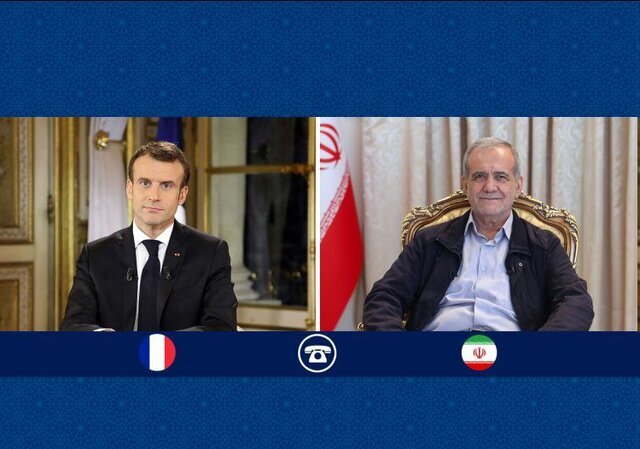IAEA’s double standards threaten regional and global peace, Pezeshkian tells Macron

TEHRAN — In a scathing rebuke of the UN nuclear watchdog, President Masoud Pezeshkian declared Iran’s suspension of cooperation with the International Atomic Energy Agency (IAEA) a “natural reaction” to Director General Rafael Grossi’s “biased, unconstructive, and destructive conduct,” which paved the way for Tel Aviv’s June 13 aggression and subsequent U.S. strikes on its civilian nuclear facilities.
During a Sunday phone call with French President Emmanuel Macron, Pezeshkian emphasized that Grossi’s failure to condemn the attacks—and his agency’s “politicized reporting”—had shattered Iran’s trust.
“Today, the position of Iran’s government, parliament, and people is that the IAEA Director General, despite established cooperation, has acted with bias toward our nuclear program. This is absolutely unacceptable,” Pezeshkian stated.
He questioned why the IAEA relied on the “criminal Israeli regime,” not party to the Nuclear Non-Proliferation Treaty (NPT)—as a reference for its reports, warning that such double standards “create grave threats to regional and global security.”
President Pezeshkian emphasized that rebuilding trust requires the IAEA to “fully adhere to its own rules” and end its hypocrisy toward the Israeli regime’s undeclared nuclear arsenal.
“When a country is bombed despite allowing inspections, what message does this send the world?” Pezeshkian asked Macron.
The president reiterated Iran’s commitment to diplomacy but warned that without IAEA reform, the agency risks becoming irrelevant—or worse, an accomplice to aggression.
Pezeshkian’s condemnation comes after Iran went through 12 days of Israeli-U.S. aggression on its nuclear, military, and civilian infrastructure, which many Iranian officials and analysts trace directly to Grossi’s destabilizing actions.
On June 12, the IAEA Board of Governors—driven by the U.S., UK, France, and Germany—passed a resolution accusing Iran of “non-compliance” over its uranium enrichment levels.
Though Grossi later clarified the IAEA found “no evidence” Iran was building nuclear weapons, the resolution was weaponized to justify Israel’s bombing campaign.
“Grossi obscured the truth in his biased report, which was then used by a genocidal regime to wage war on Iran,” Foreign Ministry spokesman Esmaeil Baqaei wrote.
The Atomic Energy Organization of Iran (AEOI) revealed in a formal letter that confidential IAEA documents were discovered in Israeli-occupied territories, suggesting the agency’s collusion with Tehran’s adversaries.
’Grossi has blood on his hands’
As the Israeli regime bombed Iran’s civilian nuclear sites and assassinated its scientists, Grossi’s conspicuous silence—coupled with his refusal to condemn the strikes—was widely interpreted as tacit endorsement.
When the U.S. joined the assault on June 22, deploying bunker-buster bombs and Tomahawk missiles against Fordow, Natanz, and Isfahan, Grossi again declined to denounce the strikes, instead demanding Iran grant his inspectors immediate access.
Mohammad Eslami, head of the AEOI, declared that Grossi has been “betraying his duties” by ignoring IAEA protocols requiring the condemnation of attacks on safeguarded facilities.
Former Foreign Minister Mohammad-Javad Zarif went further, demanding Grossi’s dismissal for “paving the path to war.”
Criticism of Grossi wasn’t limited to Iranian voices. Former UN weapons inspector Scott Ritter accused the IAEA chief of enabling Israel’s sabotage of Iran’s nuclear program by sharing intelligence that led to the assassination of Iranian scientists.
“Grossi has the blood of Iran’s nuclear scientists on his hands,” Ritter declared, urging his removal and the creation of a new inspection framework with stringent safeguards.
Furthermore, Grossi sparked new outrage during a June 25 Fox News interview.
He speculated that 900 pounds of enriched uranium were ‘unaccounted for’ and pointedly refused to rule out their storage at an ‘ancient site’ near Isfahan—a comment many Iranians viewed as laying rhetorical groundwork for targeting cultural heritage.
Parliament Speaker Mohammad-Baqer Qalibaf blasted Grossi’s “meaningless and malign” request to inspect bombed facilities, declaring the IAEA had “put its international credibility up for sale.”
On June 25, Iran’s parliament unanimously approved a bill suspending all IAEA inspections until the agency guarantees the security of Iran’s nuclear facilities.
The move, endorsed by the Guardian Council, restricts cooperation to the minimum required under the NPT.
